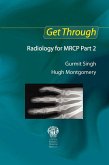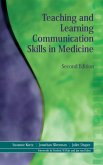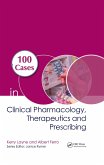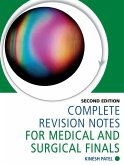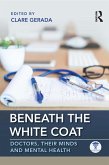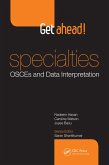30,95 €
30,95 €
inkl. MwSt.
Sofort per Download lieferbar

15 °P sammeln
30,95 €
Als Download kaufen

30,95 €
inkl. MwSt.
Sofort per Download lieferbar

15 °P sammeln
Jetzt verschenken
Alle Infos zum eBook verschenken
30,95 €
inkl. MwSt.
Sofort per Download lieferbar
Alle Infos zum eBook verschenken

15 °P sammeln
- Format: ePub
- Merkliste
- Auf die Merkliste
- Bewerten Bewerten
- Teilen
- Produkt teilen
- Produkterinnerung
- Produkterinnerung

Bitte loggen Sie sich zunächst in Ihr Kundenkonto ein oder registrieren Sie sich bei
bücher.de, um das eBook-Abo tolino select nutzen zu können.
Hier können Sie sich einloggen
Hier können Sie sich einloggen
Sie sind bereits eingeloggt. Klicken Sie auf 2. tolino select Abo, um fortzufahren.

Bitte loggen Sie sich zunächst in Ihr Kundenkonto ein oder registrieren Sie sich bei bücher.de, um das eBook-Abo tolino select nutzen zu können.
Do you know what to tell a patient with newly diagnosed cancer who asks how long he has left to live? This book contains forty-five scenarios in the format of the Practical Assessment of Clinical Examination Skills (PACES) exam. For medical students, trainees in internal medicine and general practice at all levels.
- Geräte: eReader
- mit Kopierschutz
- eBook Hilfe
Andere Kunden interessierten sich auch für
![Clinical Communication Skills in Medicine (eBook, PDF) Clinical Communication Skills in Medicine (eBook, PDF)]() Ernest SureshClinical Communication Skills in Medicine (eBook, PDF)30,95 €
Ernest SureshClinical Communication Skills in Medicine (eBook, PDF)30,95 €![Get Through Radiology for MRCP Part 2 (eBook, ePUB) Get Through Radiology for MRCP Part 2 (eBook, ePUB)]() Gurmit SinghGet Through Radiology for MRCP Part 2 (eBook, ePUB)42,95 €
Gurmit SinghGet Through Radiology for MRCP Part 2 (eBook, ePUB)42,95 €![Teaching and Learning Communication Skills in Medicine (eBook, ePUB) Teaching and Learning Communication Skills in Medicine (eBook, ePUB)]() Suzanne KurtzTeaching and Learning Communication Skills in Medicine (eBook, ePUB)57,95 €
Suzanne KurtzTeaching and Learning Communication Skills in Medicine (eBook, ePUB)57,95 €![100 Cases in Clinical Pharmacology, Therapeutics and Prescribing (eBook, ePUB) 100 Cases in Clinical Pharmacology, Therapeutics and Prescribing (eBook, ePUB)]() Kerry Layne100 Cases in Clinical Pharmacology, Therapeutics and Prescribing (eBook, ePUB)27,95 €
Kerry Layne100 Cases in Clinical Pharmacology, Therapeutics and Prescribing (eBook, ePUB)27,95 €![Complete Revision Notes for Medical and Surgical Finals (eBook, ePUB) Complete Revision Notes for Medical and Surgical Finals (eBook, ePUB)]() Kinesh PatelComplete Revision Notes for Medical and Surgical Finals (eBook, ePUB)29,95 €
Kinesh PatelComplete Revision Notes for Medical and Surgical Finals (eBook, ePUB)29,95 €![Beneath the White Coat (eBook, ePUB) Beneath the White Coat (eBook, ePUB)]() Beneath the White Coat (eBook, ePUB)26,95 €
Beneath the White Coat (eBook, ePUB)26,95 €![Get ahead! Specialties: OSCEs and Data Interpretation (eBook, ePUB) Get ahead! Specialties: OSCEs and Data Interpretation (eBook, ePUB)]() Nadeem HasanGet ahead! Specialties: OSCEs and Data Interpretation (eBook, ePUB)29,95 €
Nadeem HasanGet ahead! Specialties: OSCEs and Data Interpretation (eBook, ePUB)29,95 €-
-
-
Do you know what to tell a patient with newly diagnosed cancer who asks how long he has left to live? This book contains forty-five scenarios in the format of the Practical Assessment of Clinical Examination Skills (PACES) exam. For medical students, trainees in internal medicine and general practice at all levels.
Hinweis: Dieser Artikel kann nur an eine deutsche Lieferadresse ausgeliefert werden.
Dieser Download kann aus rechtlichen Gründen nur mit Rechnungsadresse in A, B, BG, CY, CZ, D, DK, EW, E, FIN, F, GR, HR, H, IRL, I, LT, L, LR, M, NL, PL, P, R, S, SLO, SK ausgeliefert werden.
Hinweis: Dieser Artikel kann nur an eine deutsche Lieferadresse ausgeliefert werden.
Produktdetails
- Produktdetails
- Verlag: Taylor & Francis eBooks
- Erscheinungstermin: 27. Dezember 2024
- Englisch
- ISBN-13: 9781040274989
- Artikelnr.: 72284049
- Verlag: Taylor & Francis eBooks
- Erscheinungstermin: 27. Dezember 2024
- Englisch
- ISBN-13: 9781040274989
- Artikelnr.: 72284049
- Herstellerkennzeichnung Die Herstellerinformationen sind derzeit nicht verfügbar.
Dr. Ernest Suresh is currently the head of medicine at Ng Teng Fong General Hospital in Singapore. Over the last three decades, he has worked in three different countries with contrasting healthcare systems and cultures. He has been teaching MRCP candidates for over two decades and received more than a dozen teaching excellence awards in the last ten years alone. He has regularly published educational review articles on a wide range of topics in peer-reviewed internal medicine journals and written an acute medicine handbook to guide the junior doctors in his hospital. His previous book, Clinical Consultation Skills in Medicine: A Primer for MRCP PACES, takes readers through a simple, clear and rational approach to 63 common presenting symptoms or laboratory abnormalities in medicine.
He believes that all doctors, regardless of their speciality, should practice holistically, and learn to treat the person that has the illness and not just the illness the person has. He considers himself an 'old-fashioned clinician' and pays a lot of attention to bedside clinical skills and communication, the essential traits that the Royal College expects PACES candidates to possess.
He believes that all doctors, regardless of their speciality, should practice holistically, and learn to treat the person that has the illness and not just the illness the person has. He considers himself an 'old-fashioned clinician' and pays a lot of attention to bedside clinical skills and communication, the essential traits that the Royal College expects PACES candidates to possess.
Contents Preface Conveying abnormal test results 1. The 51
Year
Old Woman with a Possible Brain Tumour 2. The 22
Year
Old Woman with New Diagnosis of Type 1 Diabetes 3. The 28
Year
Old Woman with a Positive HIV Test Result 4. The 66
Year
Old Man with Advanced Pancreatic Cancer 5. The 74
Year
Old Man with Acute Myeloid Leukaemia 6. The 27
Year
Old Woman with Possible Coeliac Disease 7. The 30
Year
Old Woman with Tuberculosis 8. The 34
Year
Old Man with Hypertrophic Cardiomyopathy Counselling on disease management 9. The 22
Year
Old Man with Recurrent Episodes of Fainting 10. Case 10 The 24
Year
Old Pregnant Woman with Suspected Pulmonary 11. Case 11 The 37
Year
Old Woman with Functional Dyspepsia 12. Case 12 The 46
Year
Old Man with Poorly Controlled Diabetes Mellitus 13. Case 13 The 78
Year
Old Woman with Hyponatremia 14. Case 14 The 26
Year
Old Woman who has had an Anaphylactic Reaction 15. Case 14 The 26
Year
Old Woman who has had an Anaphylactic Reaction Capacity, consent and confidentiality 16. Case 16 The 28
Year
Old Woman with Possible Lupus Nephritis 17. Case 17 The 19
year
old Girl whose Father Objects to a Lumbar Puncture 18. Case 18 The 66
Year
Old Man who Does Not Wish to Start Dialysis 19. Case 19 The 33
Year
Old Man who is Refusing the HIV Test 20. Case 20 The 52
Year
Old Man who wants to get Discharged Against Medical Advice Challenging patients and relatives 21. Case 21 The 77
Year
Old Man whose Daughter asks you Not to Reveal the Diagnosis of Cancer to him 22. Case 22 The 37
Year
Old Man with Gonorrhoea who asks you Not to Tell his Wife about his Diagnosis 23. Case 23 The 26
Year
Old Man who is asking to be tested for Huntington's disease 24. Case 24 The 46
Year
Old Man who is Not Compliant with his Anti
Hypertensive Medication 25. Case 25 The 65
Year
Old Woman Who Wants to Try Herbal Treatment for her Lymphoma 26. Case 26 The 24
Year
Old Man with Difficult Asthma 27. Case 27 The 63
Year
Old Woman whose Husband asks you Not to Discharge Her 28. Case 28 The 42
Year
Old Man with Non
Specific Back Pain who Demands a Scan When things go wrong 29. Case 29 The 47
Year
Old Man who is Demanding Strong Opioids for his Chronic Back Pain 30. Case 30 The 43
Year
Old Woman with No Diagnosis despite Extensive Evaluation 31. Case 31 The 66
Year
Old Man whose Sister Does Not Agree with your Diagnosis 32. Case 32 The 68
Year
Old Man whose Stroke was not Diagnosed in Time 33. Case 33 The 74
Year
Old Woman who has Suffered Harm because of a Medication Error 34. Case 34 The 78
Year
Old Man who Fell Off His Bed in the Ward End
of
life issues 35. Case 35 The 73
Year
Old Man who was Exposed to COVID in Hospital 36. Case 36 The 27
Year
Old Woman with a Severe Allergic Reaction to Sulfasalazine 37. Case 37 The 69
Year
Old Woman whose Cord Compression was not Diagnosed in Time 38. Case 38 The 69
Year
Old Woman who wants to Make a Living Will 39. Case 39 The 82
Year
Old Woman for whom the Medical Team feels that CPR Should Not be Attempted 40. Case 40 The 68
Year
Old Man with Motor Neurone Disease who needs Artificial Feeding 41. Case 41 The 70
Year
Old Man with Acute Exacerbation of COPD 42. Case 42 The 81
Year
Old Man who is Terminally Ill 43. Case 43 The 45
Year
Old Man with Severe Brain Haemorrhage 44. Case 44 The 59
Year
Old Man who has just Died from Myocardial Infarction 45. Case 45 The 53
Year
Old Woman whose Death is Unexplained
Year
Old Woman with a Possible Brain Tumour 2. The 22
Year
Old Woman with New Diagnosis of Type 1 Diabetes 3. The 28
Year
Old Woman with a Positive HIV Test Result 4. The 66
Year
Old Man with Advanced Pancreatic Cancer 5. The 74
Year
Old Man with Acute Myeloid Leukaemia 6. The 27
Year
Old Woman with Possible Coeliac Disease 7. The 30
Year
Old Woman with Tuberculosis 8. The 34
Year
Old Man with Hypertrophic Cardiomyopathy Counselling on disease management 9. The 22
Year
Old Man with Recurrent Episodes of Fainting 10. Case 10 The 24
Year
Old Pregnant Woman with Suspected Pulmonary 11. Case 11 The 37
Year
Old Woman with Functional Dyspepsia 12. Case 12 The 46
Year
Old Man with Poorly Controlled Diabetes Mellitus 13. Case 13 The 78
Year
Old Woman with Hyponatremia 14. Case 14 The 26
Year
Old Woman who has had an Anaphylactic Reaction 15. Case 14 The 26
Year
Old Woman who has had an Anaphylactic Reaction Capacity, consent and confidentiality 16. Case 16 The 28
Year
Old Woman with Possible Lupus Nephritis 17. Case 17 The 19
year
old Girl whose Father Objects to a Lumbar Puncture 18. Case 18 The 66
Year
Old Man who Does Not Wish to Start Dialysis 19. Case 19 The 33
Year
Old Man who is Refusing the HIV Test 20. Case 20 The 52
Year
Old Man who wants to get Discharged Against Medical Advice Challenging patients and relatives 21. Case 21 The 77
Year
Old Man whose Daughter asks you Not to Reveal the Diagnosis of Cancer to him 22. Case 22 The 37
Year
Old Man with Gonorrhoea who asks you Not to Tell his Wife about his Diagnosis 23. Case 23 The 26
Year
Old Man who is asking to be tested for Huntington's disease 24. Case 24 The 46
Year
Old Man who is Not Compliant with his Anti
Hypertensive Medication 25. Case 25 The 65
Year
Old Woman Who Wants to Try Herbal Treatment for her Lymphoma 26. Case 26 The 24
Year
Old Man with Difficult Asthma 27. Case 27 The 63
Year
Old Woman whose Husband asks you Not to Discharge Her 28. Case 28 The 42
Year
Old Man with Non
Specific Back Pain who Demands a Scan When things go wrong 29. Case 29 The 47
Year
Old Man who is Demanding Strong Opioids for his Chronic Back Pain 30. Case 30 The 43
Year
Old Woman with No Diagnosis despite Extensive Evaluation 31. Case 31 The 66
Year
Old Man whose Sister Does Not Agree with your Diagnosis 32. Case 32 The 68
Year
Old Man whose Stroke was not Diagnosed in Time 33. Case 33 The 74
Year
Old Woman who has Suffered Harm because of a Medication Error 34. Case 34 The 78
Year
Old Man who Fell Off His Bed in the Ward End
of
life issues 35. Case 35 The 73
Year
Old Man who was Exposed to COVID in Hospital 36. Case 36 The 27
Year
Old Woman with a Severe Allergic Reaction to Sulfasalazine 37. Case 37 The 69
Year
Old Woman whose Cord Compression was not Diagnosed in Time 38. Case 38 The 69
Year
Old Woman who wants to Make a Living Will 39. Case 39 The 82
Year
Old Woman for whom the Medical Team feels that CPR Should Not be Attempted 40. Case 40 The 68
Year
Old Man with Motor Neurone Disease who needs Artificial Feeding 41. Case 41 The 70
Year
Old Man with Acute Exacerbation of COPD 42. Case 42 The 81
Year
Old Man who is Terminally Ill 43. Case 43 The 45
Year
Old Man with Severe Brain Haemorrhage 44. Case 44 The 59
Year
Old Man who has just Died from Myocardial Infarction 45. Case 45 The 53
Year
Old Woman whose Death is Unexplained
Contents Preface Conveying abnormal test results 1. The 51
Year
Old Woman with a Possible Brain Tumour 2. The 22
Year
Old Woman with New Diagnosis of Type 1 Diabetes 3. The 28
Year
Old Woman with a Positive HIV Test Result 4. The 66
Year
Old Man with Advanced Pancreatic Cancer 5. The 74
Year
Old Man with Acute Myeloid Leukaemia 6. The 27
Year
Old Woman with Possible Coeliac Disease 7. The 30
Year
Old Woman with Tuberculosis 8. The 34
Year
Old Man with Hypertrophic Cardiomyopathy Counselling on disease management 9. The 22
Year
Old Man with Recurrent Episodes of Fainting 10. Case 10 The 24
Year
Old Pregnant Woman with Suspected Pulmonary 11. Case 11 The 37
Year
Old Woman with Functional Dyspepsia 12. Case 12 The 46
Year
Old Man with Poorly Controlled Diabetes Mellitus 13. Case 13 The 78
Year
Old Woman with Hyponatremia 14. Case 14 The 26
Year
Old Woman who has had an Anaphylactic Reaction 15. Case 14 The 26
Year
Old Woman who has had an Anaphylactic Reaction Capacity, consent and confidentiality 16. Case 16 The 28
Year
Old Woman with Possible Lupus Nephritis 17. Case 17 The 19
year
old Girl whose Father Objects to a Lumbar Puncture 18. Case 18 The 66
Year
Old Man who Does Not Wish to Start Dialysis 19. Case 19 The 33
Year
Old Man who is Refusing the HIV Test 20. Case 20 The 52
Year
Old Man who wants to get Discharged Against Medical Advice Challenging patients and relatives 21. Case 21 The 77
Year
Old Man whose Daughter asks you Not to Reveal the Diagnosis of Cancer to him 22. Case 22 The 37
Year
Old Man with Gonorrhoea who asks you Not to Tell his Wife about his Diagnosis 23. Case 23 The 26
Year
Old Man who is asking to be tested for Huntington's disease 24. Case 24 The 46
Year
Old Man who is Not Compliant with his Anti
Hypertensive Medication 25. Case 25 The 65
Year
Old Woman Who Wants to Try Herbal Treatment for her Lymphoma 26. Case 26 The 24
Year
Old Man with Difficult Asthma 27. Case 27 The 63
Year
Old Woman whose Husband asks you Not to Discharge Her 28. Case 28 The 42
Year
Old Man with Non
Specific Back Pain who Demands a Scan When things go wrong 29. Case 29 The 47
Year
Old Man who is Demanding Strong Opioids for his Chronic Back Pain 30. Case 30 The 43
Year
Old Woman with No Diagnosis despite Extensive Evaluation 31. Case 31 The 66
Year
Old Man whose Sister Does Not Agree with your Diagnosis 32. Case 32 The 68
Year
Old Man whose Stroke was not Diagnosed in Time 33. Case 33 The 74
Year
Old Woman who has Suffered Harm because of a Medication Error 34. Case 34 The 78
Year
Old Man who Fell Off His Bed in the Ward End
of
life issues 35. Case 35 The 73
Year
Old Man who was Exposed to COVID in Hospital 36. Case 36 The 27
Year
Old Woman with a Severe Allergic Reaction to Sulfasalazine 37. Case 37 The 69
Year
Old Woman whose Cord Compression was not Diagnosed in Time 38. Case 38 The 69
Year
Old Woman who wants to Make a Living Will 39. Case 39 The 82
Year
Old Woman for whom the Medical Team feels that CPR Should Not be Attempted 40. Case 40 The 68
Year
Old Man with Motor Neurone Disease who needs Artificial Feeding 41. Case 41 The 70
Year
Old Man with Acute Exacerbation of COPD 42. Case 42 The 81
Year
Old Man who is Terminally Ill 43. Case 43 The 45
Year
Old Man with Severe Brain Haemorrhage 44. Case 44 The 59
Year
Old Man who has just Died from Myocardial Infarction 45. Case 45 The 53
Year
Old Woman whose Death is Unexplained
Year
Old Woman with a Possible Brain Tumour 2. The 22
Year
Old Woman with New Diagnosis of Type 1 Diabetes 3. The 28
Year
Old Woman with a Positive HIV Test Result 4. The 66
Year
Old Man with Advanced Pancreatic Cancer 5. The 74
Year
Old Man with Acute Myeloid Leukaemia 6. The 27
Year
Old Woman with Possible Coeliac Disease 7. The 30
Year
Old Woman with Tuberculosis 8. The 34
Year
Old Man with Hypertrophic Cardiomyopathy Counselling on disease management 9. The 22
Year
Old Man with Recurrent Episodes of Fainting 10. Case 10 The 24
Year
Old Pregnant Woman with Suspected Pulmonary 11. Case 11 The 37
Year
Old Woman with Functional Dyspepsia 12. Case 12 The 46
Year
Old Man with Poorly Controlled Diabetes Mellitus 13. Case 13 The 78
Year
Old Woman with Hyponatremia 14. Case 14 The 26
Year
Old Woman who has had an Anaphylactic Reaction 15. Case 14 The 26
Year
Old Woman who has had an Anaphylactic Reaction Capacity, consent and confidentiality 16. Case 16 The 28
Year
Old Woman with Possible Lupus Nephritis 17. Case 17 The 19
year
old Girl whose Father Objects to a Lumbar Puncture 18. Case 18 The 66
Year
Old Man who Does Not Wish to Start Dialysis 19. Case 19 The 33
Year
Old Man who is Refusing the HIV Test 20. Case 20 The 52
Year
Old Man who wants to get Discharged Against Medical Advice Challenging patients and relatives 21. Case 21 The 77
Year
Old Man whose Daughter asks you Not to Reveal the Diagnosis of Cancer to him 22. Case 22 The 37
Year
Old Man with Gonorrhoea who asks you Not to Tell his Wife about his Diagnosis 23. Case 23 The 26
Year
Old Man who is asking to be tested for Huntington's disease 24. Case 24 The 46
Year
Old Man who is Not Compliant with his Anti
Hypertensive Medication 25. Case 25 The 65
Year
Old Woman Who Wants to Try Herbal Treatment for her Lymphoma 26. Case 26 The 24
Year
Old Man with Difficult Asthma 27. Case 27 The 63
Year
Old Woman whose Husband asks you Not to Discharge Her 28. Case 28 The 42
Year
Old Man with Non
Specific Back Pain who Demands a Scan When things go wrong 29. Case 29 The 47
Year
Old Man who is Demanding Strong Opioids for his Chronic Back Pain 30. Case 30 The 43
Year
Old Woman with No Diagnosis despite Extensive Evaluation 31. Case 31 The 66
Year
Old Man whose Sister Does Not Agree with your Diagnosis 32. Case 32 The 68
Year
Old Man whose Stroke was not Diagnosed in Time 33. Case 33 The 74
Year
Old Woman who has Suffered Harm because of a Medication Error 34. Case 34 The 78
Year
Old Man who Fell Off His Bed in the Ward End
of
life issues 35. Case 35 The 73
Year
Old Man who was Exposed to COVID in Hospital 36. Case 36 The 27
Year
Old Woman with a Severe Allergic Reaction to Sulfasalazine 37. Case 37 The 69
Year
Old Woman whose Cord Compression was not Diagnosed in Time 38. Case 38 The 69
Year
Old Woman who wants to Make a Living Will 39. Case 39 The 82
Year
Old Woman for whom the Medical Team feels that CPR Should Not be Attempted 40. Case 40 The 68
Year
Old Man with Motor Neurone Disease who needs Artificial Feeding 41. Case 41 The 70
Year
Old Man with Acute Exacerbation of COPD 42. Case 42 The 81
Year
Old Man who is Terminally Ill 43. Case 43 The 45
Year
Old Man with Severe Brain Haemorrhage 44. Case 44 The 59
Year
Old Man who has just Died from Myocardial Infarction 45. Case 45 The 53
Year
Old Woman whose Death is Unexplained


